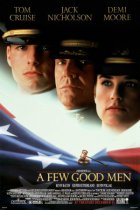
A Few Good Men Page #33
- R
- Year:
- 1992
- 138 min
- 3,779 Views
KENDRICK:
That's fine.
KAFFEE:
Lance Corporal Dawson's ranking after
Infantry Training School was perfect.
Records indicate that over half that
class has since been promoted to
full corporal, while Dawson has
remained a lance corporal. Was
Dawson's promotion held up because
of this last fitness report.
KENDRICK:
I'm sure it was.
KAFFEE:
Do you recall why Dawson was given
such a poor grade on this report?
KENDRICK:
I'm sure I don't. I have many men in
my charge, Lieutenant, I write many
fitness reports.
KAFFEE:
Do you recall an incident involving
a PFC Curtis Barnes who'd been found
stealing liquor from the Officer's
Club?
KENDRICK:
Yes.
KAFFEE:
Did you report private Barnes to the
proper authorities?
KENDRICK:
I have two books at my bedside,
Lieutenant, the Marine Code of Conduct
and the King James Bible. The only
proper authorities I'm aware of are
my Commanding Officer, Colonel Nathan
R. Jessep and the Lord our God.
KAFFEE:
Lt. Kendrick, at your request, I can
have the record reflect your lack of
acknowledgment of this court as a
proper authority.
ROSS:
Objection. Argumentative.
RANDOLPH:
Sustained.
(to KAFFEE)
Watch yourself, counselor.
KAFFEE:
Did you report Private Barnes to
your superiors?
KENDRICK:
I remember thinking very highly of
Private Barnes, and not wanting to
see his record tarnished by a formal
charge.
KAFFEE:
You preferred it to be handled within
the unit.
KENDRICK:
I most certainly did.
KAFFEE:
Lieutenant, do you know what a Code
Red is?
KENDRICK:
Yes I do.
KAFFEE:
Have you ever ordered a code red?
KENDRICK:
No, I have not.
KAFFEE:
Lieutenant, did you order Dawson and
two other men to make sure that
Private Barnes receive no food or
drink except water for a period of
seven days?
KENDRICK:
That's a distortion of the truth.
Private Barnes was placed on barracks
restriction. He was given water and
vitamin supplements, and I assure
you that at no time was his health
in danger.
KAFFEE:
I'm sure it was lovely for Private
Barnes, but you did order the barracks
restriction, didn't you? And you did
order the denial of food.
KENDRICK:
Yes.
KAFFEE:
Wouldn't this form of discipline be
considered a code red?
KENDRICK:
(beat)
Not necessarily.
KAFFEE:
If I called the other 8000 men at
Guantanamo Bay to testify, would
they consider it a Code Red?
ROSS:
Please the court, the witness can't
possibly testify as to what 8000
other men would say. We object to
this entire line of questioning as
argumentative and irrelevant badgering
of the witness.
RANDOLPH:
The Government's objection is
sustained, Lt. Kaffee, and I would
remind you that you're now questioning
marine officer with an impeccable
service record.
ROSS:
Thank you judge.
KAFFEE looks over at DAWSON. They share a brief moment before
KAFFEE turns back to KENDRICK.
KAFFEE:
Lieutenant, was Dawson given a rating
of Below Average on this last fitness
report because you learned held been
sneaking food to Private Barnes?
(to ROSS)
Not so fast.
(to KENDRICK)
Lieutenant?
Translation
Translate and read this script in other languages:
Select another language:
- - Select -
- 简体中文 (Chinese - Simplified)
- 繁體中文 (Chinese - Traditional)
- Español (Spanish)
- Esperanto (Esperanto)
- 日本語 (Japanese)
- Português (Portuguese)
- Deutsch (German)
- العربية (Arabic)
- Français (French)
- Русский (Russian)
- ಕನ್ನಡ (Kannada)
- 한국어 (Korean)
- עברית (Hebrew)
- Gaeilge (Irish)
- Українська (Ukrainian)
- اردو (Urdu)
- Magyar (Hungarian)
- मानक हिन्दी (Hindi)
- Indonesia (Indonesian)
- Italiano (Italian)
- தமிழ் (Tamil)
- Türkçe (Turkish)
- తెలుగు (Telugu)
- ภาษาไทย (Thai)
- Tiếng Việt (Vietnamese)
- Čeština (Czech)
- Polski (Polish)
- Bahasa Indonesia (Indonesian)
- Românește (Romanian)
- Nederlands (Dutch)
- Ελληνικά (Greek)
- Latinum (Latin)
- Svenska (Swedish)
- Dansk (Danish)
- Suomi (Finnish)
- فارسی (Persian)
- ייִדיש (Yiddish)
- հայերեն (Armenian)
- Norsk (Norwegian)
- English (English)
Citation
Use the citation below to add this screenplay to your bibliography:
Style:MLAChicagoAPA
"A Few Good Men" Scripts.com. STANDS4 LLC, 2025. Web. 31 Jan. 2025. <https://www.scripts.com/script/a_few_good_men_160>.







Discuss this script with the community:
Report Comment
We're doing our best to make sure our content is useful, accurate and safe.
If by any chance you spot an inappropriate comment while navigating through our website please use this form to let us know, and we'll take care of it shortly.
Attachment
You need to be logged in to favorite.
Log In